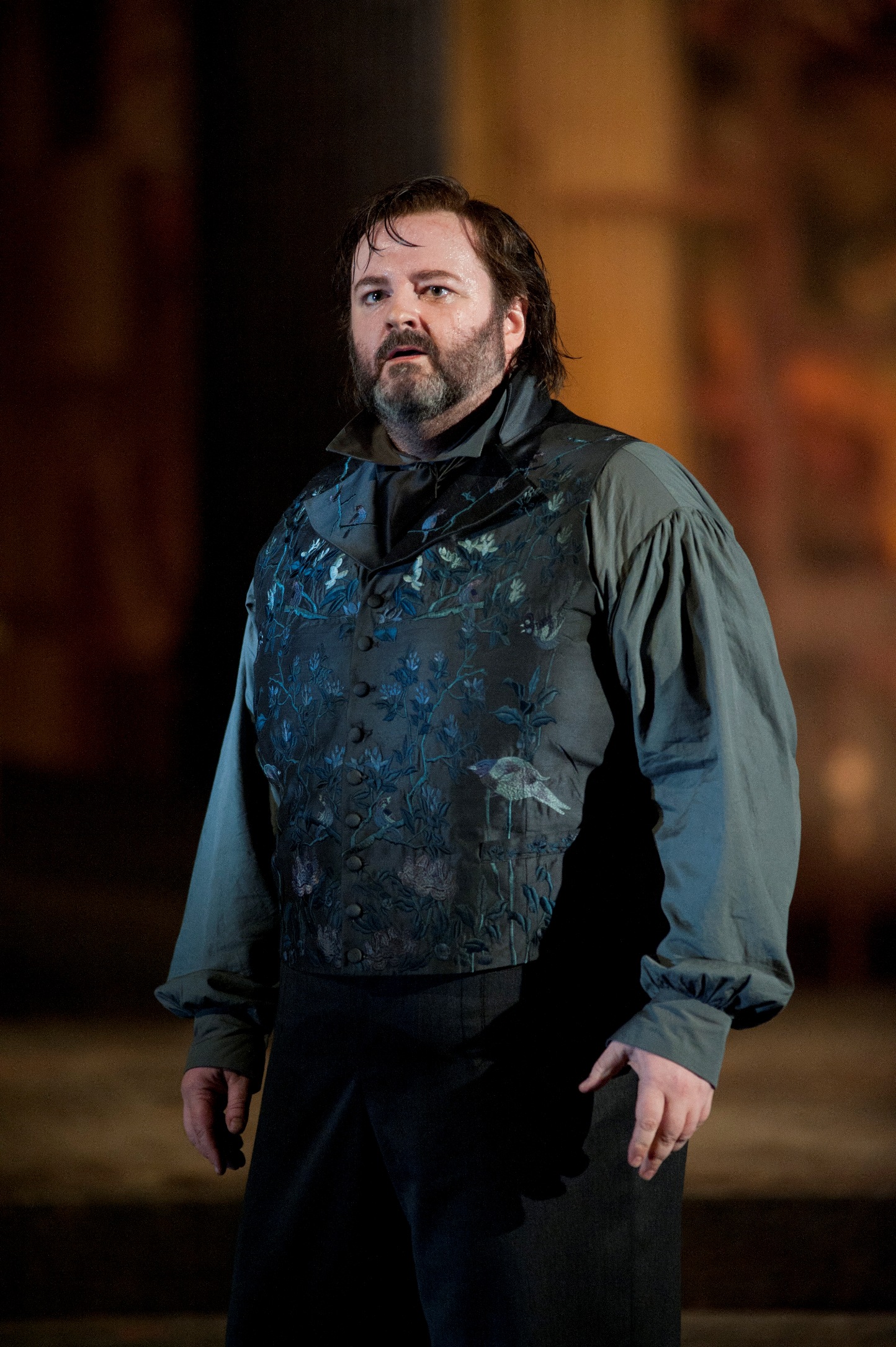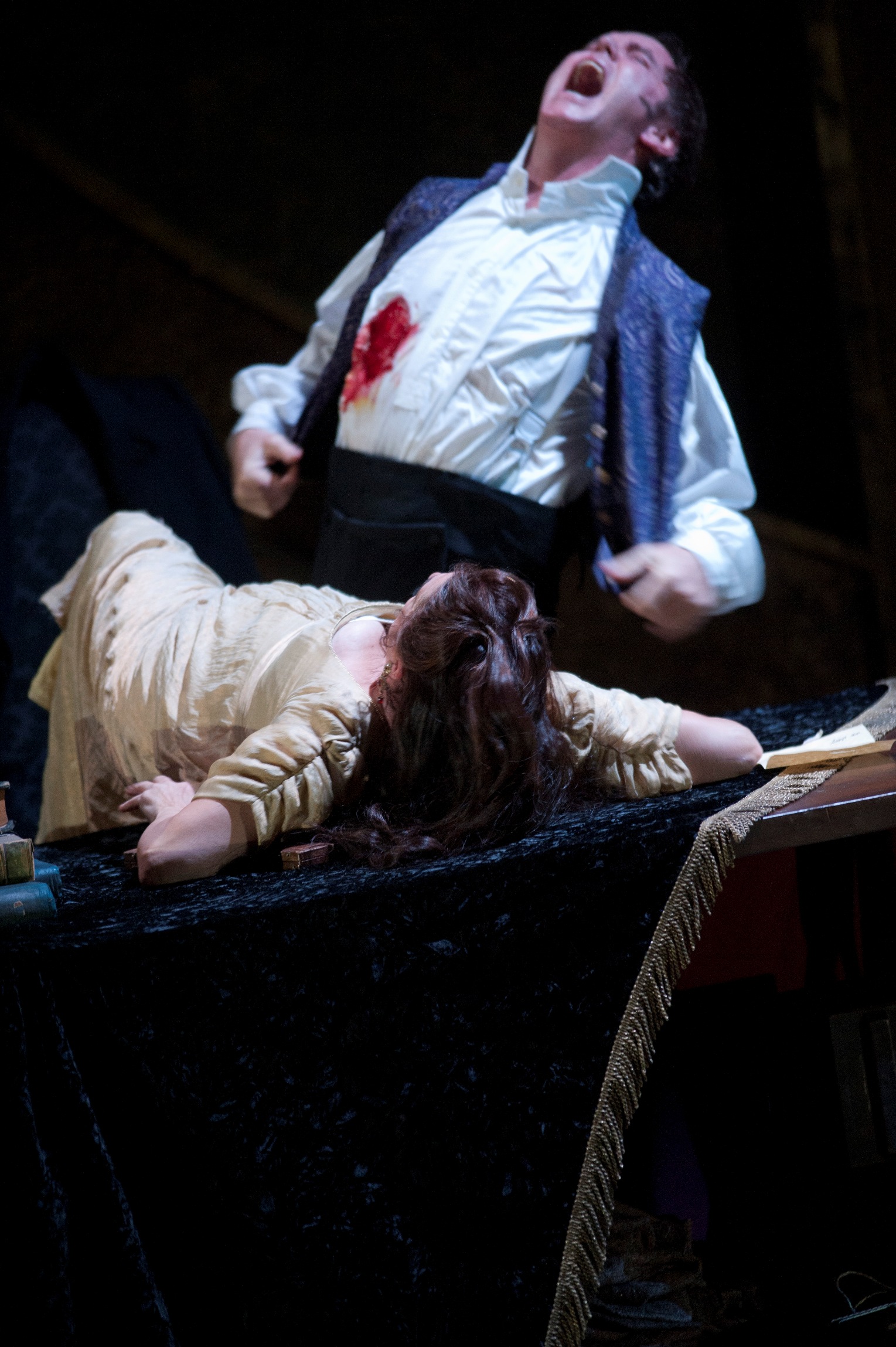Who is more likely to be an operatic creature of flesh and blood: Puccini's young diva, unexpectedly caught up in the infernal machine of a lustful tyrant, or Tchaikovsky's teenager impetuously pouring out her soul in a love letter to a man she's just fallen for? Usually, you'd go for Tatyana over Tosca every time. At ENO it's currently the other way round. While Deborah Warner's new production of Eugene Onegin unfathomably misses most of the truths in a story we can all identify with, Catherine Malfitano's take on the best if most overdone Italian operatic thriller in the repertoire makes potentially outlandish melodrama believable. That's almost as true of the revival as it was of this ENO Tosca's impressive first outing, even if the two lovers this time round are less lissom.
As in the Onegin, the principals are vocally up to the mark - and that's no mean achievement here given three big British voices going flat-out for some of the toughest physical singing in all Italian opera. They need to be loud to ride conductor Stephen Lord's exciting, detailed but sometimes over-broad and relentlessly grand approach to Puccini's ever-astonishing score; you wish he'd sometimes rein the ENO Orchestra in a little to let the battle of the top notes in the sadistic Act II confrontations really ring out.
 The victory cry of Gwyn Hughes Jones's Jacobin Cavaradossi (pictured right) at the news of Napoleon's victory uniquely does, simply because Puccini lets it stand apart from the orchestra, and a magnificent job he makes of it. Act I's introductory aria is a bit blowsy - this is only supposed to be an artist comparing beauties, after all - and rather short on sunshine and roses, but Hughes Jones does find some subtlety in the great lament we can only refer to as "E lucevan le stelle" (and it really is time Edmund Tracey's creaky and often ill-fitting English translation was replaced with one that moved a little with the times and the musical lines).
The victory cry of Gwyn Hughes Jones's Jacobin Cavaradossi (pictured right) at the news of Napoleon's victory uniquely does, simply because Puccini lets it stand apart from the orchestra, and a magnificent job he makes of it. Act I's introductory aria is a bit blowsy - this is only supposed to be an artist comparing beauties, after all - and rather short on sunshine and roses, but Hughes Jones does find some subtlety in the great lament we can only refer to as "E lucevan le stelle" (and it really is time Edmund Tracey's creaky and often ill-fitting English translation was replaced with one that moved a little with the times and the musical lines).
Claire Rutter's Tosca is a generous spirit with an only occasionally troubling vibrato in the middle register; again the top is unflinchingly full and intense. Her most straightforward duet with her lover before it all goes wrong settles to something rather gorgeous, even if this pair aren't quite as believable in love as Amanda Echalaz and Julian Gavin were last time round. Rutter's strongest moment in the first act, though, is the feeling she projects just before she leaves into the last pang of jealousy kindled by Iago-esque Scarpia, playing on her fatal questioning of lover Mario's fidelity.
This, you suspect, is a battle of wills that can only kindle further, especially given Anthony Michaels-Moore's effortless projection in the grand "Te Deum" cocktail of lust and religion. And it does, avoiding the pitfalls of stagey, melodramatic Scarpia-Tosca confrontations in the most celebrated of all operatic central acts. All that's missing for the last degree of callous, calculating authority is a resonance to Michaels-Moore's lower depths; some of the bottom notes get lost.
 Rutter makes believable a youngish woman fearfully improvising her way through a political mousetrap of which she had no inkling, and being further appalled as it turns personal. She also manages Italianate artistry at the climax of the aria I'm once again going to insist on identifying as "Vissi d'arte", a convincingly frozen moment in time. Malfitano's staging otherwise presents every dramatic turn of the screw in Scarpia's awful bargaining with a helpless woman as plausible, so that the twist of the knife (the aftermath of "Tosca's kiss" pictured left) comes to seem inevitable.
Rutter makes believable a youngish woman fearfully improvising her way through a political mousetrap of which she had no inkling, and being further appalled as it turns personal. She also manages Italianate artistry at the climax of the aria I'm once again going to insist on identifying as "Vissi d'arte", a convincingly frozen moment in time. Malfitano's staging otherwise presents every dramatic turn of the screw in Scarpia's awful bargaining with a helpless woman as plausible, so that the twist of the knife (the aftermath of "Tosca's kiss" pictured left) comes to seem inevitable.
You sense, too, Puccini's unsurpassable sense of musical-dramatic timing even if Lord, for all the wonderful colours he brings out from the orchestra - a lustrous harp sweep here, a scything double-bass line there - doesn't have the fire and air ENO music director Edward Gardner brought to the score last time round. The endgame on the battlements of the Castel Sant'Angelo, though, is as strong and satisfying as it was then, with Rutter bearing out the metaphysical dimension of set designer Frank Philipp Schlössmann's starry night sky - no dawn for this Tosca - in a final fall from a height which is liberating rather than desperate. Even if you've become used to the starry Gheorghiu-Kaufmann-Terfel trio, in Jonathan Kent's much less perceptive Royal Opera staging, you shouldn't be disappointed by this.
- Tosca at English National Opera until 29 January, 2012














Add comment